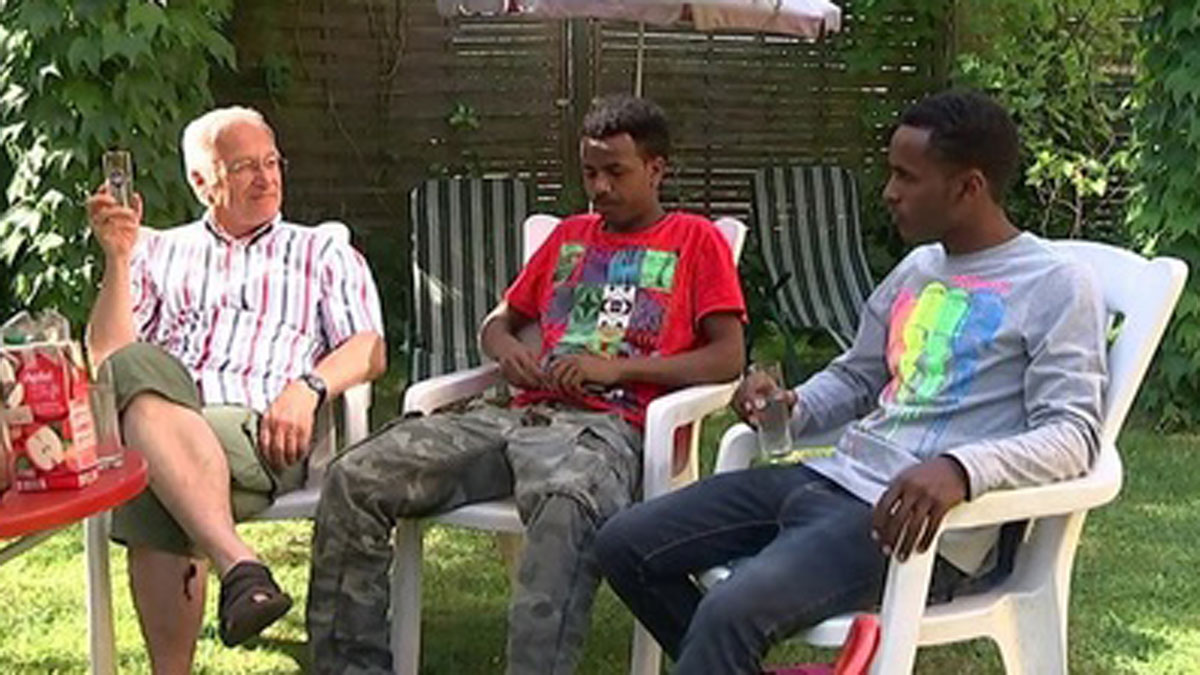German MP invites Eritrean asylum seekers to live with his family
Martin Patzelt said opening up his home might help 'get rid of the hostility' towards migrants in Germany

A free daily email with the biggest news stories of the day – and the best features from TheWeek.com
You are now subscribed
Your newsletter sign-up was successful
A conservative German politician has welcomed two asylum seekers into his home and is urging other citizens to do the same.
Martin Patzelt, an MP in the ruling Christian Democrats Party, invited the young men to live with him and his family after meeting them at his local church.
The two men, 19-year-old Haben and 24-year-old Awet, fled conflict in Eritrea and crossed the Mediterranean from Libya in a small wooden boat , the Daily Telegraph reports.
The Week
Escape your echo chamber. Get the facts behind the news, plus analysis from multiple perspectives.

Sign up for The Week's Free Newsletters
From our morning news briefing to a weekly Good News Newsletter, get the best of The Week delivered directly to your inbox.
From our morning news briefing to a weekly Good News Newsletter, get the best of The Week delivered directly to your inbox.
They have been in Germany for 18 month and are currently learning German with the Patzelt family as they await a verdict on their asylum application and take part in work placement schemes.
The Patzelts have five grown children and ten grandchildren of their own. One of their sons still lives at home, sharing the top floor of the house with Haben and Awet.
The invitation to the two men came after Patzelt wrote an open letter suggesting that German citizens should open up their home to refugees instead of housing them in migrant hostels.
It comes at a time when hostility towards migrants and refugees is increasing in many parts of the country, with Germany receiving the highest number of asylum applications out of any EU nation.
A free daily email with the biggest news stories of the day – and the best features from TheWeek.com
Earlier this year, the country witnessed the rise of the far-right group Pegida which calls for stricter immigration laws and limits to the country's refugee intake.
But Patzelt believes initiatives like his would go a long way in getting rid of the "polarisation and hostility" some people in Germany feel towards migrants and refugees.
"Partnership, providing shelter, looking after people, welcoming them – these small bridges help to give refugees a face and a name, so that they emerge from the anonymous mass of asylum seekers," he told German ARD TV. "If more people did that... we'd be on a good path."
-
 The Olympic timekeepers keeping the Games on track
The Olympic timekeepers keeping the Games on trackUnder the Radar Swiss watchmaking giant Omega has been at the finish line of every Olympic Games for nearly 100 years
-
 Will increasing tensions with Iran boil over into war?
Will increasing tensions with Iran boil over into war?Today’s Big Question President Donald Trump has recently been threatening the country
-
 Corruption: The spy sheikh and the president
Corruption: The spy sheikh and the presidentFeature Trump is at the center of another scandal
-
 Epstein files topple law CEO, roil UK government
Epstein files topple law CEO, roil UK governmentSpeed Read Peter Mandelson, Britain’s former ambassador to the US, is caught up in the scandal
-
 Iran and US prepare to meet after skirmishes
Iran and US prepare to meet after skirmishesSpeed Read The incident comes amid heightened tensions in the Middle East
-
 Israel retrieves final hostage’s body from Gaza
Israel retrieves final hostage’s body from GazaSpeed Read The 24-year-old police officer was killed during the initial Hamas attack
-
 China’s Xi targets top general in growing purge
China’s Xi targets top general in growing purgeSpeed Read Zhang Youxia is being investigated over ‘grave violations’ of the law
-
 Panama and Canada are negotiating over a crucial copper mine
Panama and Canada are negotiating over a crucial copper mineIn the Spotlight Panama is set to make a final decision on the mine this summer
-
 Why Greenland’s natural resources are nearly impossible to mine
Why Greenland’s natural resources are nearly impossible to mineThe Explainer The country’s natural landscape makes the task extremely difficult
-
 Iran cuts internet as protests escalate
Iran cuts internet as protests escalateSpeed Reada Government buildings across the country have been set on fire
-
 US nabs ‘shadow’ tanker claimed by Russia
US nabs ‘shadow’ tanker claimed by RussiaSpeed Read The ship was one of two vessels seized by the US military